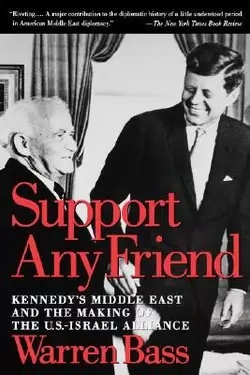
Support Any Friend
Kennedy's Middle East and the Making of the U.S.-Israel Alliance

- Book
- Foreign policy analyses written by CFR fellows and published by the trade presses, academic presses, or the Council on Foreign Relations Press.
Read an excerpt of Support Any Friend.
In his timely, perceptive, and elegantly written book, Senior Fellow Warren Bass offers striking new insights into the origins of today's Middle East. He illuminates three of the most memorable figures of the twentieth century and their diplomatic struggles at the height of the Cold War: David Ben-Gurion, Israel's indomitable founding father; Egyptian president Gamal Abdel Nasser, the charismatic Arab nationalist; and the young and dynamic John F. Kennedy.
More on:
The Kennedy period, Bass writes, was no "mere place-marker between Suez and the Six Day War, between the martial frostiness of Dwight Eisenhower and the Texan warmth of Lyndon Johnson." He shows how Kennedy sought greater influence in the Arab world, offering more foreign aid and a new diplomatic overture to Nasser, the Arab world's leading radical.
Bass's analysis traces the political maneuvering that brought U.S.-Israel relations to their current warmth. Initially, Kennedy and Nasser engaged in a rich personal correspondence. But when Nasser intervened in Yemen's civil war, Kennedy countered by deploying fighter jets to Saudi Arabia as a warning to Egypt. Meanwhile, Kennedy made the first major U.S. arms sale to Israel—a crucial policy shift that marked the beginning of America's alliance with the Jewish state. The support came with a caveat, however: Kennedy insisted that Israel open its nuclear weapons program to U.S. inspectors, a demand that led to a grave confrontation. Drawing on meticulous research, Bass paints a fresh portrait of a presidency critical to the foundation of the Middle East as we now know it.
A Council on Foreign Relations Book
More on:
 Online Store
Online Store